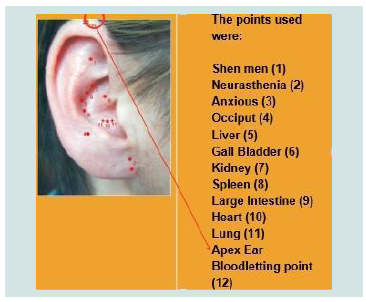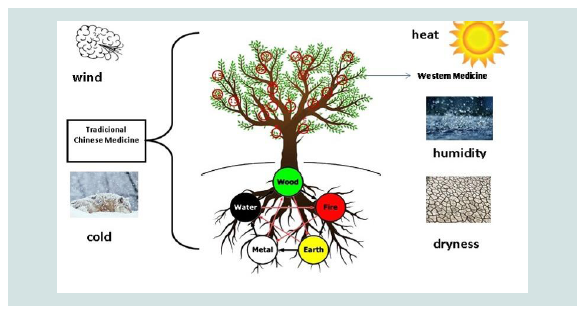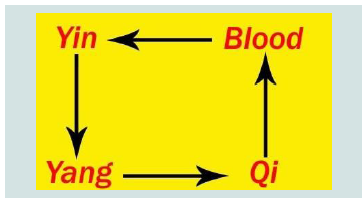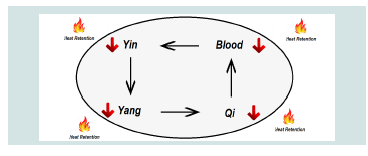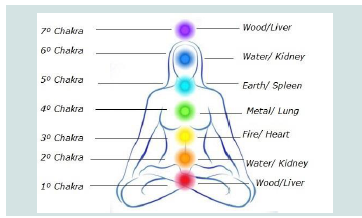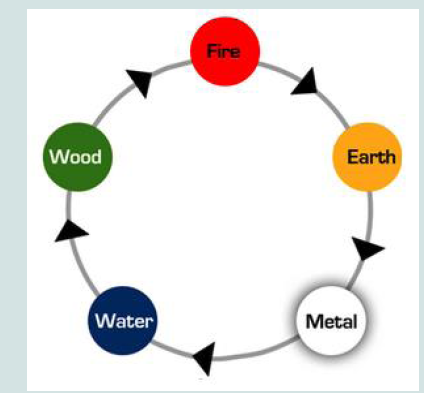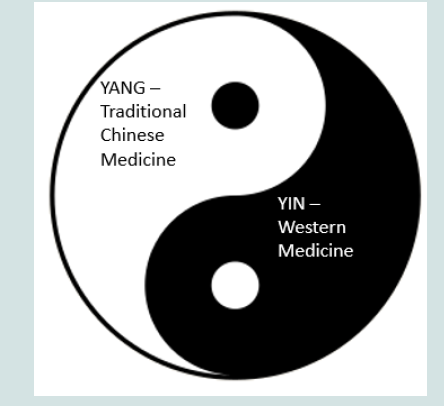Journal of Andrology & Gynaecology
Download PDF
Research Article
Energy Imbalances and Chakras Energy Replenishment to Treat Patients with Urinary Incontinence and Sexual Dysfunction PostCancer Prostatectomy
Huang WL*
Medical Acupuncture and Pain Management Clinic, Brazil
*Address for Correspondence: Huang WL, Infectious diseases, General Practice, Nutrition, Acupuncture and Pain Management Specialist. Medical Acupuncture and Pain Management Clinic, Rua Homero Pacheco Alves, 1929, Franca, Sao Paulo, 14400-010, Brazil, Phone: +55 16 3721-2437; E-mail: weilingmg@gmail.com
Submission: 22 May, 2020;
Accepted: 26 June, 2020;
Published: 30 June, 2020
Copyright: © 2020 Huang WL. This is an open access article distributed
under the Creative Commons Attribution License, which permits
unrestricted use, distribution, and reproduction in any medium, provided
the original work is properly cited.Copyright: © 2020 Huang WL. This is an open access article distributed
under the Creative Commons Attribution License, which permits
unrestricted use, distribution, and reproduction in any medium, provided
the original work is properly cited.
Abstract
Statement of the Problem:
Urinary incontinence is a common side
effect of prostatectomy, affecting 6-8% of men who pass through the
surgery. In Traditional Chinese Medicine (TCM), urinary incontinence is
caused by Kidney Yang deficiency.Purpose:
To demonstrate that patients with post-prostatectomy
urinary incontinence and sexual dysfunction, have Kidney-Yang
energy deficiency and deficiency on the chakras energy meridians.
The treatment of these imbalances on the root level are important for
the success on the treatment of this pathology.Methods:
One case report, patient named J.D.S, 60-year-old
male. The patient had prostate cancer and performed the procedure
of prostatectomy. Before performing the procedure, the patient
had mild sexual dysfuntion. After he developed urinary incontinence
(requiring the use of penis diapers) and had total sexual dysfunction.
He received the recommendation from his urologist of Duloxetine
use for improvement of urinary incontinence, with no improvement.
He started treatment with ancient medical tools. They were: Chinese
dietary counselling, auricular acupuncture with apex ear bloodletting,
systemic acupuncture and moxibustion. The patient also received
measurement of the chakras energy centers, and all seven chakras
were in the minimum level (1) out of 8. Treatment with homeopathy
and crystal-based medication were initiated to replenish the energy
of the chakras.Results:
With the use of these tools, the patient presented cure of
the urinary incontinence, recovering the control over his bladder, not
requiring the use of penis diapers any longer. After the treatment, the
patient also reported to have improvement in his sexual performance,
as he could not maintain sexual activity before the energy-based
treatment.Conclusion:
Based on this case report, patients with urinary
incontinence and sexual dysfunction post-cancer prostatectomy have
energy imbalances and chakras energy deficiency as the root of the
symptoms. The treatment rebalancing these energies and replenishing
the chakras energy centers, with high-diluted medications is crucial for
the recovery of the symptoms presented after the surgery.Keywords
Urinary incontinence; Sexual dysfunction; Postprostatectomy; Traditional Chinese medicine; Acupuncture; Energy; Diet; Moxibustion; Homeopathy; Crystal-Based Medications; Chakras
Introduction
Urinary incontinence is defined as unintentional loss of urine, being a symptom of a problem on the urinary tract. There are three types of incontinence. Stress incontinence, urge incontinence and overflow incontinence [1-3].
Urinary incontinence is a common side effect of prostatectomy,
affecting 6-8% of men who pass through the surgery. As during
the surgery, one of the valves is removed, according to Western
medicine, Kegel exercises and some medications may recover the
well-functioning of the urinary tract [1-3].
Kimberly Hoiland, on the article entitled Post-Radical
Prostatectomy Incontinence: Etiology and Prevention, states that
prostate cancer is the most common for men over 50 years old, and
the associations between urinary incontinence and prostatectomy
surgery appear as high as 80% in literature [4].
According to this same article, the majority of patients recover
naturally from the urinary incontinence during the period postoperative period, varying from the first weeks after surgery to 12
months [4].
In traditional Chinese medicine, urinary incontinence is
associated with Kidney Yang deficiency. It is possible that the patient
already had energy deficiencies and Heat retention before the surgery,
which lead to the formation of cancer. These energy imbalances would
worse with the surgery, the Blood loss and other fluids, leading to the
process of urinary incontinence after the surgery. Therefore, treating
these energy imbalances is very important for the patient in their
post-surgery period, in this case, patients who just had prostatectomy
surgery. It is important for the physician to know about these energy
imbalances to treat the patient adequately [5].
For the treatment of the pathology presented by this specific
patient, the author anchored her reasoning on the treatment in a
specific case of a patient the author had in 2006. This patient was
a 70-year-old male patient, who reported pain in the legs and was
diagnosed with Kidney-Yang deficiency, according to TCM. He
received treatment with Chinese dietary counseling, acupuncture and
auricular acupuncture associated with apex ear bloodletting [6-9].
With the treatment done, the pain in the legs diminished and
the patient was submitted to an interview after the treatment. In this
interview, 30 days after the treatment, the patient revealed that his eye
pressure had also lowered with the treatment, as his ophthalmologist
confirmed. During the treatment, he had not reported to be treating glaucoma in the last 40 years with no improvement of his condition.
With the treatment performed, his intraocular pressure lowered from
40 mm Hg to 17 mm Hg [6-9].
This interesting case became the cornerstone of the author studies
in the field, trying to comprehend how the treatment based on the
root of the problem could treat different diseases and symptoms
simultaneously and using the same methods [6-9].
Purpose
To demonstrate that patients with post-prostatectomy urinary
incontinence and sexual dysfunction, have Kidney-Yang energy
deficiency and deficiency on the chakras energy meridians. The
treatment of these imbalances on the root level are important for the
success on the treatment of these pathologies.
Methods
The method used in this article was to analyze the literature
available in Western and traditional Chinese medicine, along with
the use of a case report of a 60- years-old male patient, J.D.S. The
patient had symptoms of sexual dysfunction, which worsened after
performing radical retropubic prostatectomy surgery due to prostate
cancer after the surgery, he developed urinary incontinence. The
patient also had used testosterone blockers, to diminish the possibility
of acquiring a new cancer and Duloxetine, to control the urinary
incontinence. A year after the surgery, he still had the symptoms of
urinary incontinence, even with the use of medication.
The background of the patient shown that he already had sexual
dysfunction a year before the surgery. Two years before the surgery he
had sexual intercourse four times a week, a year before the surgery, he
felt his sexual appeal diminish, what worsened after the surgery, with
no capacity of having erections.
He went to the urologist, who recommended treatment with
Sildenafil. The patient decided not to perform the treatment with
this medication, because he had friends who have died from the use
of this medication. The urinary incontinence started soon after the
surgery. The patient did not want to use diapers or penis diapers, despite having them at home. This situation altered the self-stem of
the patient very much, causing symptoms of depression.
He started treatment with the author. At first, he was diagnosed
with Kidney-Yang deficiency, Qi deficiency, Blood deficiency and
Heat retention according to TCM. After, it was started a treatment for
his energy imbalances, first with Chinese dietary counseling, which
consisted in avoid dairy products, raw food, cold drinks, sweets. He
was also advised to avoid soda, coffee and matte tea. He supposed to
avoid fried food, coconut, chocolate, honey, alcoholic beverages, eggs
and melted cheese. He was oriented to eat grilled and boiled food,
drink lukewarm water. The treatment was accompanied by twice
a week sessions of auricular acupuncture, associated with apex ear
bloodletting and moxibustion.
The auricular acupuncture points used are described in (Figure 1).
The patient also received measurement of the chakras energy
centers through the procedure of radiesthesia. The measurement
shown that all patients chakras were at the minimum level (1),
considering a scale of 1 to 8.
After the measurement he received homeopathy based on the
theory created by the author entitled Constitutional Homeopathy
of the Five Elements based on Traditional Chinese Medicine and
crystal-based medication to replenish the energy of the chakras.
The homeopathies prescribed were: Sulphur 30CHXX-20
(single dose), Calcarea carbonica 30CHXX-20 (single dose), Silicea
30CHXX-20 (single dose), Natrium muriaticum 30CHXX-20 (single
dose), Phosphorus 30CHXX-20. The homeopathies were prescribed
to be taken in a single dose with a hiatus of three days between the
medications, necessarily on the sequence described.
When this sequence was finished, the same medications were
taken on the same sequence but in 200CHXX-20 instead of 30CHXX20, with the same three days’ hiatus.
Two months later, a new sequence of treatment was started,
with the same medications taken on the same order, but now with
1000CHXX-20 instead of 200CHXX-20.
Two months later, a new sequence of treatment was started, as the
others, with the same medications taken on the same order, now with
10000CHXX-20 instead of 1000CHXX-20.
Figure 2a: Schematic Drawing of the Tree as a Metaphor between Traditional
Chinese Medicine and Western Medicine.
Two months later, a new sequence of treatment was started, as the
others, with the same medications taken on the same order, now with
50000CHXX-20 instead of 10000CHXX-20.
The crystal-based medications used will be described on the
discussion section.
Results
After two sessions, the patient started feeling improvement of
all his symptoms, feeling more disposition, happiness and energy,
and was completely recovered from the urinary incontinence within
a month of treatment. Despite the improvement, he continues the
treatment to maintain the balance of the energy.
After more than one year of treatment, he received a new chakras
energy measurement, he continued to be with the minimum level of
energy, even though there was improvement of his symptoms.
The patient reports that when he does not do acupuncture
sessions and does not use the medications he feels less disposed, with
sadness, negative thinking and with less energy to work. There was
a period of time when the patient stopped the use of the medication
and had a depressive crisis, even thinking about suicide. After he
restarted the treatment he felt great difference in his emotional status,
with happiness, less negative thinking, etc.
On the beginning of the treatment, the patient had not described
to have sexual dysfunction after the surgery and the doctor was not
aware of this symptoms before the treatment. After the treatment
he reported an improvement in his sexual capacity, now being able
to have intercourse without the use of medications to treat erectile
dysfunction.
His urology exams concerning cancer evaluation (Prostatespecific antigen) all appear as normal, until May of 2020.
Discussion
The urinary incontinence and sexual dysfunction are common
side effect of prostatectomy surgery [10,11].
There are three types of urinary incontinence. The first one is
Stress Urinary Incontinence (SUI); this type is characterized by the
weakness of pelvic muscles. The main way of cure for SUI is exercises
in order to fortify the pelvic muscles. These exercises are entitled
Kegel exercises [10].
The second type is the Overactive Bladder (OB), also called
urgency incontinence. The process of this type of incontinence is miss
signal sent by the brain, that understands that the bladder needs to be
emptied, when it is not completely full yet. The main consequence is
the lack of control of bladder every time the urge to urinate appears
[10].
The third type is the mixed incontinence, that happens when the
patient has both SUI and OB [10].
In Western medicine, therapy for urinary incontinence includes
behavioral therapy, physiotherapy (such as Kegel and other similar
exercises), medications and surgery. Duloxetine is the first licensed
drug for the treatment of urinary incontinence, with rates of success
around 66% [12].
According to literature, prostate cancer is the most common
cancer type in male patients over 50 years old. There are different
kinds of prostatectomy: The first is open prostatectomy, that can
be divided in two types: radical retropubic prostatectomy and
laparoscopic prostatectomy, divided in other two types: Laparoscopic
radical prostatectomy and robotic-assisted laparoscopic radical
prostatectomy [13].
All these different kind of surgeries are associated with postsurgical urinary incontinence. Incontinence rates after prostatectomy
vary in the current literature, and can be as high as 80% [1-4].
The treatment can vary from Kegel exercises, to even more
conservative measures, such as diminishing or withdrawing caffeine
and alcohol, not drinking liquids at night, etc., as demonstrated on
the study of Bilal Chughtai, entitled Conservative Treatment for
Postprostatectomy Incontinence [14].
Given that the majority of patients recover continence over a period that is variable, and can range from 6 months to 12 months in
most cases [10-14].
Sexual dysfunction is also associated with radical retropubic
prostatectomy, and the symptoms may start before the surgery.
More than 50% of men with prostate cancer are at risk for erectile
dysfunction. The biopsy may itself have a detrimental effect [11].
In other studies of the author, the metaphor of the tree was
placed to explain better the relation between Western and traditional
Chinese medicine, as well as the concepts of leaf-level and root-level
developed by the author in several of her studies [6-9].
This metaphor has the objective to link what has already been
described in Western and traditional Chinese medicine. In this
schematic drawing of the tree, it is possible to visualize the root, trunk,
several branches and coming out of each of these branches, many
leaves (Figure 2). The leaves represent the symptoms, the branches
represent the medical specialties, and the whole tree represent
the human body, that is formed by energy. The energy imbalances
are represented by Yin and Yang and Five Elements theory and
corresponds to the root of the tree. These energy imbalances can
influence health of the leaves or development of the disease. The
tree is also surrounded by external pathogenic factors (Wind, Cold,
Heat, Dryness and Humidity) which will also influence the balance
of the energy. There is a communication between the leave-level and
the root level, with the energy passing through from the root to all
the meridians. When there is an energy imbalance on the root, it can
reflect on the whole tree in many organs and systems in different
specialties [6-9].
The main idea of this study is to understand how Western and
traditional Chinese medicines see the symptoms and signs from
two different perspectives. In the treatment of urinary incontinence
and sexual dysfunction in post-cancer - prostatectomy surgery as
TCM aims to see the patient as a whole, the first important step for
treatment is the analysis of the patient history, diet, environment, life
style, emotional aspects, etc [15,16].
In the Yellow Emperor’s Classic of Internal Medicine, it is stated
that in order to perform a diagnosis of any pathologies, it is important
to analyze the symptoms and classify them into Yin and Yang in order
to perform the diagnosis. The Bladder, according to the Five Elements
Theory is the hollow organ related to the Kidney meridian or massive
organ. The Kidney meridian is linked to the Water element and the
correspondent emotion is fear. Yang energy is important to maintain
the organs up, on their places. When there is a lack of Yang energy,
there is a tendency of the internal organs to fall. This is why the
person with urinary incontinence cannot maintain the urine inside
the Bladder, due to Kidney-Yang deficiency [17].
The Kidney meridian or the second chakra is also associated
with the reproduction and sexual function. The formation of cancer
is also related to the general lack of energy on the body, when the
general energy of all the meridians is treated, as well as the Kidney,
all symptoms will improve at the same time. This is why the sexual
dysfunction improved, because the root of the tree was treated, what
was the cause of all the patients’ symptoms, including the prostate
cancer. As the patient already had done the surgery for treating the
cancer, the treatment of the lack of energy was important for the
patient to maintain a normal level of energy, to avoid the recurrence
of the cancer, or its appearance in different organs. According
to TCM, the energy of the patient, when balanced, will fight the
formation of malign cells, eliminating them without the necessity of
using medication [18].
The patient on the case report had Kidney-Yang deficiency,
because he felt very cold on the body, especially on the extremities
(hands and feet), as Yang energy is responsible for warming the
body, the deficiency of the Yang energy can lead to the patient feeling
colder, with cold feet and hands. This is why the patient was oriented
to eat boiled and grilled food and avoid raw food, which has cold
energy, worsening the Yang deficiency. The patient was also oriented
to drink lukewarm water, because the energy of the water is naturally
cold. Warming the water changes the energy from cold to neutral,
improving Yang energy.
Table 2: Medications chosen in the treatment of the studied patient, according to the correspondence of Chakras and Five Elements.
As the patient had a Kidney deficiency, the patient was oriented
to eat food with black color, such as black beans and black dried
grapes, because foods with that color tone the Kidney energy, with
the exception of coffee and Coke, which are black but may harm the
Kidney energy.
The patient was also oriented to eat pig’s Kidney, to help to
improve the Kidney energy that was low. According to the book The
Five Elements on the Balanced Diet, written by Ilse Maria Fahmow
and Jurgen Fahmow, the consumption of the kidney of other animals
can tonify the water element. When there is a need of fortifying this
element, other important foods for consumption are different kinds
of fish and plums.
The patient on the clinical case report had other deficiencies besides
Kidney-Yang deficiency. This happens because the energies inside
the body are all interconnected (Figure 1). Treating the imbalance of
Yin,Yang,Qi and Blood it is possible to treat several symptoms and
diseases at the same time. This was part of a study presented in 2015,
at an Acupuncture Research Conference at the Faculty of Medicine of
Harvard University in Boston, entitled ACUPUNCTURE VIEWED
HOLISTICALLY CAN TREAT ALL THE PATIENT'S DISEASES
SIMULTANEOUSLY - A CASE STUDY. The summary of this study
states that if we treat the patients’ energy imbalances (Figure 2), we
will treat all the patient’s symptoms at the same time; even if the
doctor does not know the patient has such a symptom. With this type
of reasoning, we will be able to treat all diseases of all specialties at the
same time, as we treat in this case, the root of the problems and not
only the symptoms [6-9].
When there is deficiency in one of these four energies, there is
formation of internal Heat, as showed in (Figure 3).
Cancer, in traditional Chinese medicine, develops when the patient
has deficiency of energy and formation of internal Heat. Therefore,
the treatment proposed to treat post-cancer prostatectomy urinary
incontinence, is treating, at the same time, the energy imbalance that
lead to the formation of cancer. A study regarding the treatment of
cancer based on chronic energy imbalances would be presented by
the author in 3rd Global Summit on Allergy and Immunology, in
Paris in March 2020. On this study, three cases of patients with cancer
were analyzed, two of them had complete cure of the cancer only using this kind of reasoning without the necessity of radiotherapy,
chemotherapy or surgery, and the third patient was in treatment with
chemotherapy for Lung cancer, with metastasis, and recovered from
the metastasis without relapses. When he was performing treatment
for cancer, there was diminution of the metastasis but they would
reappear in other organs, on the nervous system, on the abdominal
wall, on the cervical glands, having performed surgery to take out the
tumor on the nervous system. When the energy-based treatment was
associated, the metastasis disappeared and there were no relapses.
In order to make an energy imbalances diagnosis, the patient is
submitted to the questions proposed in (Table 1).
* Blood deficiency can be understood as anemia in the energy
level. As Blood deficiency may take years to appear in the laboratory
exams, the patient with constipation and a normal Complete Blood
Count (CBC) can still be considered a patient with Blood deficiency,
according to TCM, depending based on the symptoms he/she may
present.
The patient in the case report had other energy deficiencies, such as
Blood deficiency (no daily bowel movement), Qi deficiency (sweating
during the day with no physical activity), Yang deficiency (cold in
the extremities) and Heat retention (dry month and itchiness on the
skin). To treat the Yang deficiency causing the urinary incontinence
and sexual dysfunction all the other energy deficiencies had to be
treated, because one energy depends on the other. This was possible
through Chinese dietary counseling, to increase nutrient absorption
and to improve Blood production. As stated by Hippocrates “make
your food your medicine, and your medicine, your food”.
Despite the diet, the treatment was also associated with auricular
acupuncture and apex ear bloodletting, because through the apex
ear bloodletting procedure it was possible to take out internal Heat,
and through auricular acupuncture, it was possible to rebalance
Yin,Yang,Qi and Blood.
The auricular acupuncture points used to tone each energy are
better described in the article of the author entitled How Do You
Treat Back Pain in Your Practice? Part 2, published on the Medical
Acupuncture Journal in February of 2018 [19].
The patient also received moxibustion, which is a tool traditional Chinese medicine, centered on burning dried mugwort on particular
points on the body. It plays an important role in the traditional
medical systems of China, Tibet, Japan, Korea, Vietnam, and
Mongolia. In the patients of the author, the moxa used was made of
coal warmed on a stove.
In the case of the patient presented on the case report, he had a
Kidney-Yang deficiency. Moxibustion was used to tone the energy of
the Kidney, improving the Yang energy, and in this way, improving
the condition of urinary incontinence and sexual dysfunction
presented by the patient.
The patient also received measurement of the chakras energy
meridian, because each chakra corresponds to one massive organ
of the Five Elements theory, according to the study entitled The
Geometry of Emotions: Using Chakra Acupuncture and 5-Phase
Theory to Describe Personality Archetypes for Clinical Use as showed
in [20] (Figure 4).
As the patient in this case report was diagnosed with no energy on
any of the five massive organs or chakras energy centers, all energies
from all the organs were treated. The second chakra is correspondent
to the Kidney, which is responsible for the Bladder and the sexual
function. The Kidney receives energy from the Lung, which receives
energy from the Spleen. The Spleen receives energy from the Heart,
and the Heart receives energy from the Liver. This scheme is called
Generation Cycle and is better shown in (Figure 5).
The treatment the patient received, besides having improved the
symptoms he was presenting, also treated the cause of the cancer on
the energy level, diminishing the possibilities of the patient acquiring
cancer on the future, as well as preventing other diseases such as
diabetes, myocardial infarction, hypertension, depression, anxiety,
etc, previously described by the author in her studies [6-9].
The patient received treatment to replenish the chakras energy
with high-diluted medications. Homeopathy and crystal-based
medications were used. The medications chosen are described in
(Table 2)
These medications were chosen instead of high-concentrated
medication due to the Arndt-Schultz law.
According to the Arndt-Schultz’s law, all drugs in high
concentrations cause a reduction of vital energy. This reduction
would generate the patient's energy weakness and the formation of
internal Heat due to energy imbalances [6-9].
As the patient was already with the energy very weak, diagnosed
through radiesthesia, and also had a history of cancer, what shows,
indirectly, that the patient had a severe energy deficiency, it was
preferred to avoid the use of high-concentrated drugs in any
circumstances, because it might worsen the energy of the patient,
compromising the treatment of urinary incontinence and sexual
dysfunction, that according to the TCM literature is caused by
deficiency of Kidney-Yang deficiency. The patient also presented
deficiency on the other energies. The worsening of the energy
deficiencies of the patient could also be associated with the formation
of other chronic diseases in the future or the recurrence of the cancer,
or the appearance of other types of cancer in other organs.
According to Hippocrates: “First, do no harm”.
Currently, Western and traditional Chinese medicine are
different for most physicians around the world. However, they can be
integrated. In (Figure 6), a metaphor of Yin and Yang as the different
kinds of medicine was created. For the adequate treatment of urinary
incontinence and sexual dysfunction post-cancer prostatectomy
surgery, it is important to associate traditional Chinese medicine and
Western medicine, so the patient can treat the symptoms and the root
of the problem, which are the extreme lack of energy of Yin, Yang,
Qi, Blood and Heat retention, associated with severe deficiency of the
chakras energy centers [4-14].
Conclusion
According to this case report, patients with urinary incontinence
and sexual dysfunction post-cancer prostatectomy surgery
have energy imbalances and chakras energy deficiencies as an
underlying cause. To have a successful treatment of this kind of
patient, the correction of these energy imbalances through Chinese
dietary counseling, auricular acupuncture, apex ear bloodletting,
moxibustion, and replenishment of the chakras energy deficiency
through homeopathy according to Constitutional Homeopathy of the
Five Elements based on Traditional Chinese Medicine and crystalbased medication intake are important.
The integral treatment of the patient is significant and not only
the localized treatment, focused on symptoms.


